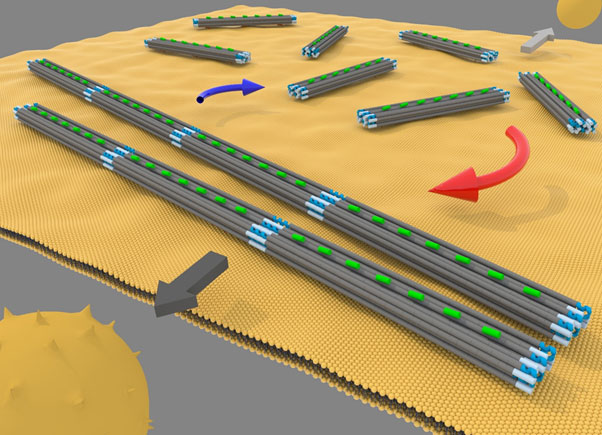Our research focus
Most cellular and biological functions, such as signal transduction, protein folding, membrane remodelling or even pathogen toxicity, require the concerted activity and self-organization of various biomolecules (e.g. proteins, lipids or nucleic acids). Due to the cellular complexity, however, deciphering basic principles and fundamental physicochemical laws underlying such vital events remains a difficult task.
The Biomimetic Nanotechnology Junior Research Group aims then decipher the structure-function relations of such biomolecular complexes, mainly associated with biomembranes, using bottom-up in vitro approaches. Overall, the group explores cell/membrane biophysics, DNA origami nanotechnology and microscopy methods, to artificially mimic and recreate minimal biological features and pathways from scratch; as well as develop novel responsive nanostructures and tools for targeting/sensing pathogenic biomolecules and cellular/microbial entities of clinical relevance.

Figure: Dr. Henri Franquelim / MPI Biochemistry, Dep. Schwille
Our Group
GROUP LEADER

Scientific career
since 02/2022
Junior Research Group Leader for “Biomimetic Nanotechnology”, Research and Tranfer Centre for Bioactive Matter (b-ACTmatter) and Peter Debye Institute for Soft Matter Physics (Dep. Prof. Frank Cichos), University of Leipzig, Germany
09/2017 – 01/2022
Senior Postdoctoral Researcher and Project Leader in “Membrane-active DNA origami nanotechnology” (SFB 863), Cellular & Molecular Biophysics Department (Prof. Petra Schwille), Max Planck Institute of Biochemistry, Martinsried, Germany
09/2012 – 08/2017
Postdoctoral Researcher and Alexander von Humboldt Fellow (2013-2015)
Cellular & Molecular Biophysics Department (Prof. Petra Schwille), Max Planck Institute of Biochemistry, Martinsried, Germany
10/2007 – 07/2012
PhD in Biomedical Sciences (summa cum laude)
Physical Biochemistry lab (Prof. Miguel Castanho), Institute of Molecular Medicine, Fac. Medicine Uni. Lisbon, Portugal
Dissertation: The role of lipid membranes in the mechanism of action of sifuvirtide and other HIV-1 fusion inhibitors (Advisor: Prof. Miguel Castanho; Co-advisor: Prof. Nuno Santos).
09/2003 – 08/2007
Degree in Biochemistry (Licentiate; honored with merit grants)
Faculty of Sciences, University of Lisbon, Portugal
Thesis: Lipid membranes as a key factor for the efficacy of the HIV-1 fusion inhibitor sifuvirtide
(Advisor: Prof. Miguel Castanho)
Prizes, fellowships and major awards
2018
MPIB Junior Scientists’ Publication Award (JPSA), Martinsried, Germany
2017
Best Poster Award, EBSA/IUPAB Congress, Edinburgh, UK
2016
CeNS Best Interdisciplinary Publication Award, CeNS, Munich
2013 – 2015
Alexander von Humboldt Postdoc Research Fellowship, AvH Stiftung
2011
Finalist of COHiTEC entrepreneurship program (member of team), COTEC & ISCTE, Portugal
2010
Winner of Idea-2-Product Portugal (member of team), COTEC, Portugal
2nd place Idea-2-Product Europe (member of team), RWTH Aachen, Germany
Best YSF Oral Presentation Award, IUBMB Congress, Melbourne, Australia
2009
Best Poster Award, EBSA Congress, Genoa, Italy
2008 – 2011
FCT Doctoral Fellowship, FCT Portugal
2008
BES Award (for best graduate students), Fac. Sciences Univ. Lisbon
Selected publications
- Hartrampf N, Leitão S, Winter N, Toombs-Ruane H, Frank JA, Schwille P, Trauner D, Franquelim HG* (2022) Structural Diversity of Photoswitchable Sphingolipids for Optodynamic Control of Lipid Raft Microdomains. BioRxiv, DOI: 10.1101/2021.10.11.463883. [*corresponding author]
- Franquelim HG*, Dietz H, Schwille P (2021) Reversible membrane deformations by straight DNA origami filaments. Soft Matter, 17(2): 276-287. [* corresponding author]
- Ochmann S, Joshi H, Büber E, Franquelim HG, Stegemann P, Sacca B, Keyser U, Aksimentiev A, Tinnefeld P (2021) DNA Origami Voltage Sensors for Transmembrane Potentials with Single-Molecule Sensitivity. Nano Lett, 21(20): 8634-8641.
- Chattopadhyay M, Krok E, Orlikowska H, Schwille P, Franquelim HG, Piatkowski L (2021) Hydration layer of only few molecules controls lipid mobility in biomimetic membranes. J Am Chem Soc, 143(36): 14551-14562.
- Franquelim HG, Khmelinskaia A, Sobczak JP, Dietz H, Schwille P (2018) Membrane curvature induction by curved DNA-based scaffolds. Nat Commun, 9(1): 811.
- Khmelinskaia A, Franquelim HG*, Petrov EP, Schwille P (2016) Effect of anchor positioning on binding and diffusion of elongated 3D DNA nanostructures on lipid membranes. J Phys D: Appl Phys, 49(19):194001. [* corresponding author]
- Frank JA, Franquelim HG, Schwille P, Trauner D (2016) Optical control of lipid rafts with photoswitchable ceramides. J Am Chem Soc, 138(39): 12981-12986.
- Kaufmann A, Beier V, Franquelim HG, Wollert T (2014) Molecular mechanism of autophagic membrane-scaffold assembly and disassembly. Cell, 156(3): 469-481.

PhD STUDENTS

M.Sc. Rayehe Mamaghaniyeh
Research and Transfer Center for bioactive Matter b-ACTmatter
Deutscher Platz 5
04103 Leipzig

M.Sc. Subhasini Singh
Research and Transfer Center for bioactive Matter b-ACTmatter
Deutscher Platz 5
04103 Leipzig